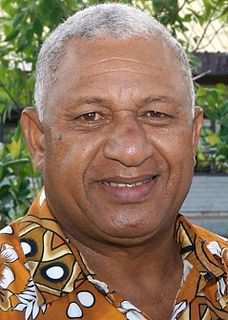| |||||||||||||||||||||||||
All 52 seats to the House of Representatives | |||||||||||||||||||||||||
|---|---|---|---|---|---|---|---|---|---|---|---|---|---|---|---|---|---|---|---|---|---|---|---|---|---|
| Registered | n/a | ||||||||||||||||||||||||
| Turnout | n/a | ||||||||||||||||||||||||
| |||||||||||||||||||||||||
| |||||||||||||||||||||||||
 |
|---|
| This article is part of a series on the politics and government of Fiji |
Legislative
|
Judiciary |
|
General elections were held in Fiji between 15 and 29 April 1972, [1] the first since independence from the United Kingdom in 1970. They were characterised by the lack of rancour between racial groups, typical of the 1966 general election and the 1968 by-elections.

Fiji, officially the Republic of Fiji, is an island country in Melanesia, part of Oceania in the South Pacific Ocean about 1,100 nautical miles northeast of New Zealand's North Island. Its closest neighbours are Vanuatu to the west, New Caledonia to the southwest, New Zealand's Kermadec Islands to the southeast, Tonga to the east, the Samoas and France's Wallis and Futuna to the northeast, and Tuvalu to the north. Fiji consists of an archipelago of more than 330 islands—of which 110 are permanently inhabited—and more than 500 islets, amounting to a total land area of about 18,300 square kilometres (7,100 sq mi). The most outlying island is Ono-i-Lau. The two major islands, Viti Levu and Vanua Levu, account for 87% of the total population of 898,760. The capital, Suva, on Viti Levu, serves as the country's principal cruise-ship port. About three-quarters of Fijians live on Viti Levu's coasts, either in Suva or in smaller urban centres such as Nadi—where tourism is the major local industry—or Lautoka, where the sugar-cane industry is paramount. Due to its terrain, the interior of Viti Levu is sparsely inhabited.

The United Kingdom, officially the United Kingdom of Great Britain and Northern Ireland but more commonly known as the UK or informally as Britain, is a sovereign country lying off the north-western coast of the European mainland. The United Kingdom includes the island of Great Britain, the north-eastern part of the island of Ireland and many smaller islands. Northern Ireland is the only part of the United Kingdom that shares a land border with another sovereign state—the Republic of Ireland. Apart from this land border, the United Kingdom is surrounded by the Atlantic Ocean, with the North Sea to the east, the English Channel to the south and the Celtic Sea to the south-west, giving it the 12th-longest coastline in the world. The Irish Sea lies between Great Britain and Ireland. With an area of 242,500 square kilometres (93,600 sq mi), the United Kingdom is the 78th-largest sovereign state in the world. It is also the 22nd-most populous country, with an estimated 66.0 million inhabitants in 2017.
The result was a landslide for the Alliance Party of the Prime Minister, Ratu Sir Kamisese Mara, which won 33 of the 52 seats, and surprised many observers by capturing almost 25 percent of the Indo-Fijian vote. The Indo-Fijian-dominated National Federation Party, led by Sidiq Koya, won the remaining 19 seats.

The Alliance Party, was the ruling political party in Fiji from 1966 to 1987. Founded in the early 1960s, its leader was Ratu Sir Kamisese Mara, the founding father of the modern Fijian nation. Widely seen as the political vehicle of the traditional Fijian chiefs, the Alliance Party also commanded considerable support among the Europeans and other ethnic minorities, who, although comprising only 3–4% of Fiji's population, were over represented in the parliament. Indo-Fijians were less supportive, but the Fijian-European block vote kept the Alliance Party in power for more than twenty years.

The Prime Minister of the Republic of Fiji is the head of government of Fiji. The Prime Minister is appointed by the President under the terms of the 2013 Constitution of Fiji.

Ratu Sir Kamisese Mara, CF, GCMG, KBE is considered the founding father of the modern nation of Fiji. He was Chief Minister from 1967 to 1970, when Fiji gained its independence from the United Kingdom, and, apart from one brief interruption in 1987, the first Prime Minister from 1970 to 1992. He subsequently served as president from 1993 to 2000.
The election re-affirmed the political allegiances of the past, with the Alliance Party winning all the Fijian Communal seats, with 82% of the votes, as well as all the General Communal seats. The National Federation Party (NFP), on the other hand, won all the Indian Communal sets with 73% of the votes. Voter turnout was 85.2% in the communal seats.
After the election, cooperation between the two major parties continued with R. D. Patel of the NFP elected the speaker of the Alliance-dominated House of Representatives.
Raojibhai Dahyabhai Patel was an Indo-Fijian lawyer and politician, who was better known as the younger brother of A. D. Patel. To distinguish between the two, he was generally referred to as R.D. Although he lacked his brother's charisma and oratorical skills, he was much loved and admired by members of his community.


